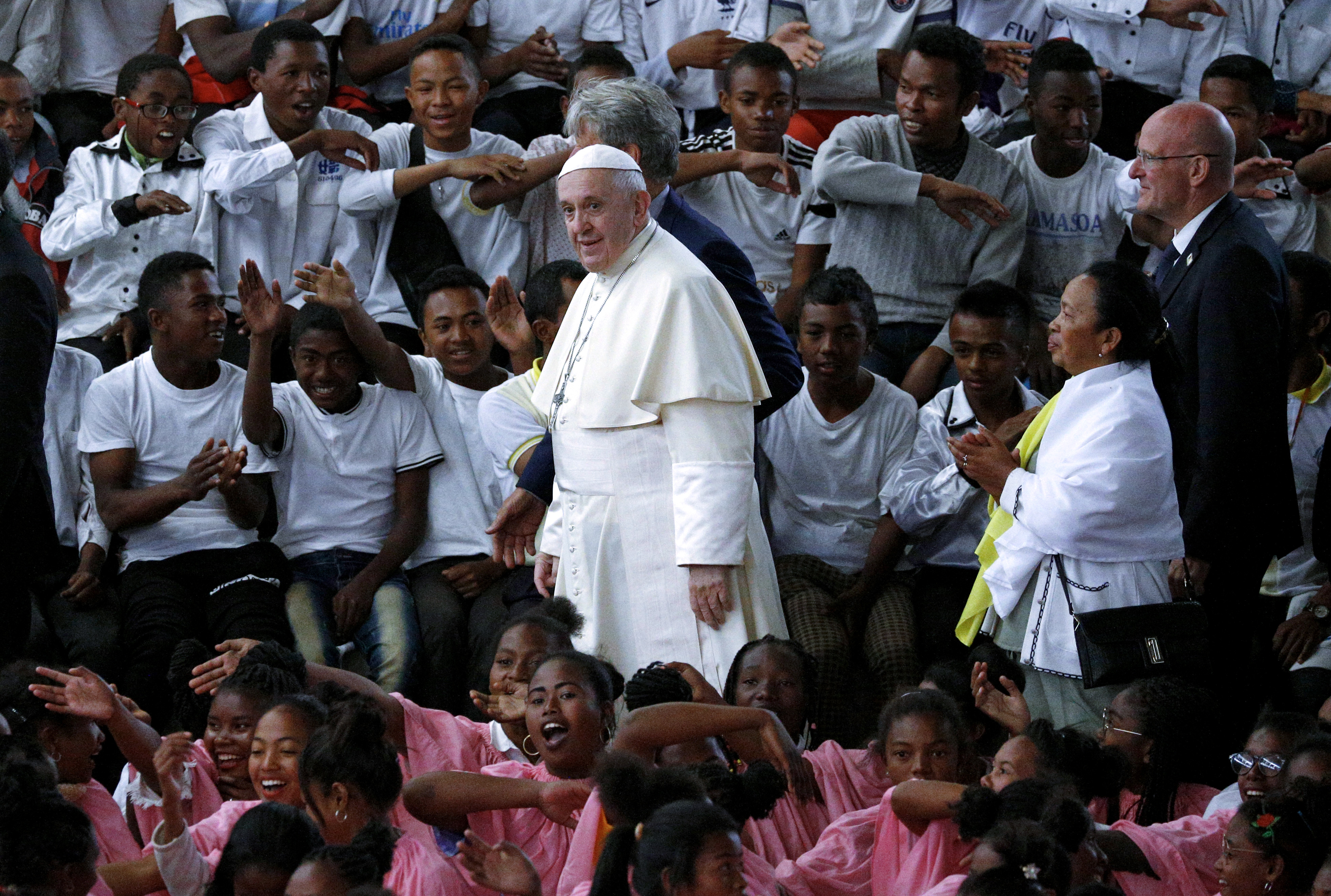ANTANANARIVO, Madagascar (CNS) — God’s plan for humanity involves community, mutual support, sharing and caring for each other and for the earth, Pope Francis said.
“As we look around us, how many men and women, young people and children are suffering and in utter need. This is not part of God’s plan,” he said Sept. 8, celebrating Mass on a dusty, red dirt field on the outskirts of Antananarivo.
Madagascar is one of the world’s 10 poorest countries. According to the World Bank, 75 precent of the population lives on less than $1.90 a day.
Close to 1 million people gathered on the Soamandrakizay field for the pope’s Mass, according to local organizers. Many had spent the night, sleeping on straw mats or plastic tarps and bundled up against a windy winter chill.
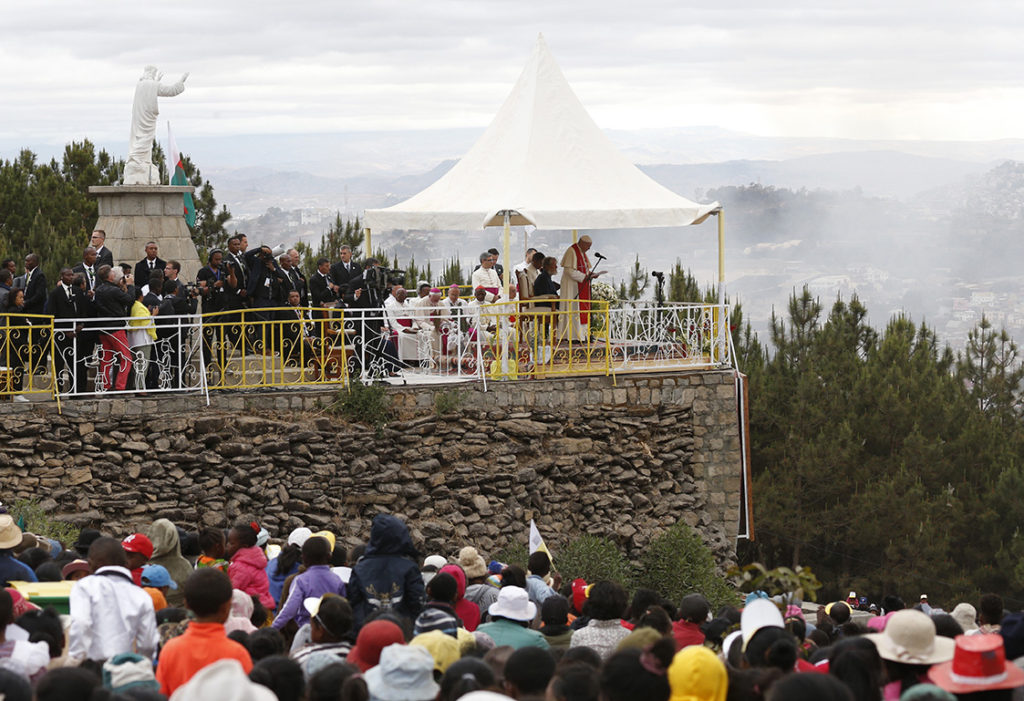
At the beginning of his homily, the pope acknowledged the sacrifice people made to get to the Mass site and, especially, the discomfort endured by those who camped out.
Madagascan President Andry Rajoelina, a Catholic, and his wife, Mialy, sat near the front of the crowd as Pope Francis preached about the Gospel call to solidarity and the joy that comes from putting faith before power or possessions.
He urged the nation’s people “to make your beautiful country a place where the Gospel becomes life and where life is for the greater glory of God.”
The Sunday Gospel reading from Luke included the line: “If anyone comes to me without hating his father and mother, wife and children, brothers and sisters, and even his own life, he cannot be my disciple.”
Pope Francis said Jesus was explaining that “bonds of blood or membership in a particular group, clan or particular culture” have no bearing on who is blessed, whose dignity should be honored or who, finally, will enter heaven.
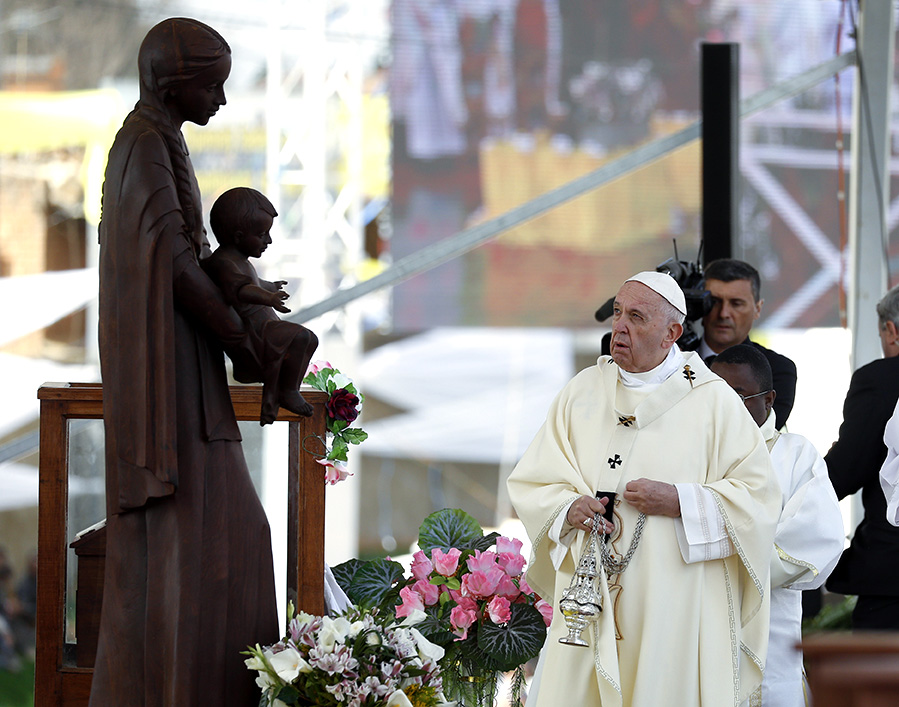
“When ‘family’ becomes the decisive criterion for what we consider right and good,” he said, “we end up justifying and even ‘consecrating’ practices that lead to the culture of privilege and exclusion: favoritism, patronage and, as a consequence, corruption.”
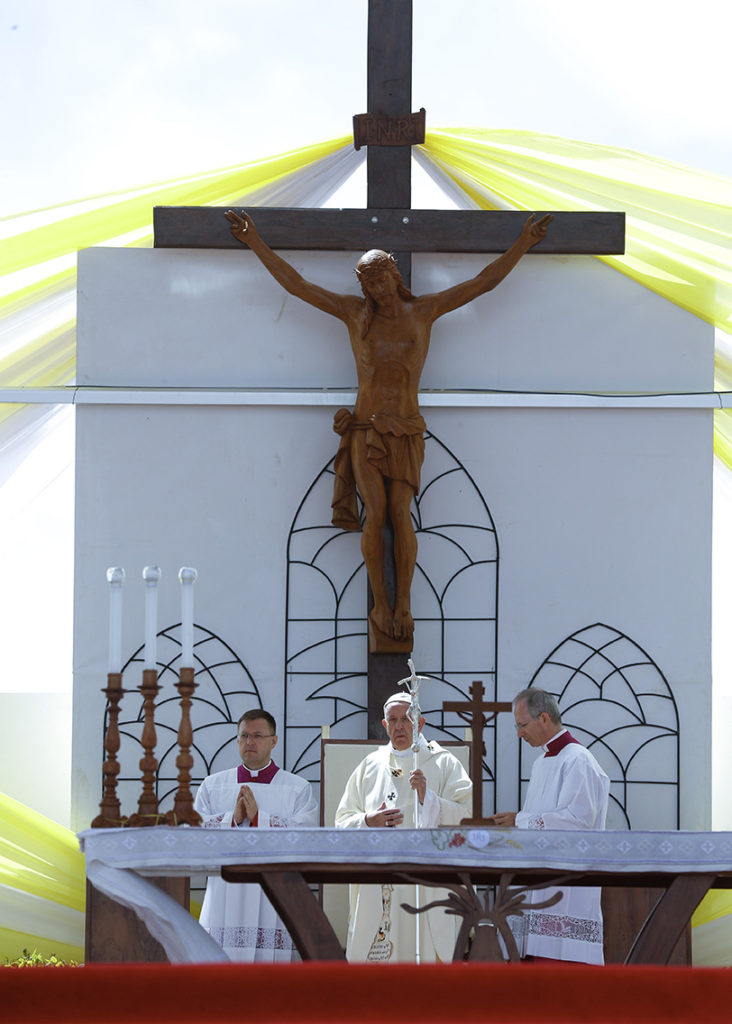
The Gospel passage also condemns any ideology that would “abuse the name of God or of religion to justify acts of violence, segregation and even murder, exile, terrorism and marginalization.”
Jesus’ teaching emphasized that “one of the worst forms of enslavement” is “living only for oneself,” the pope said. People who focus only on themselves might feel safe for a while, but they end up “becoming bitter, grumbling, without life.”
What God wants, he said, is for people to extend a helping hand to others and to let them know that they are loved by God and have a dignity that cannot be taken away and should not be attacked.
The Gospel calls Christians to work for social justice, Pope Francis said. “Together we can resist all those forms of idolatry that make us think only of the deceptive securities of power, career, money and of the search for human glory.”
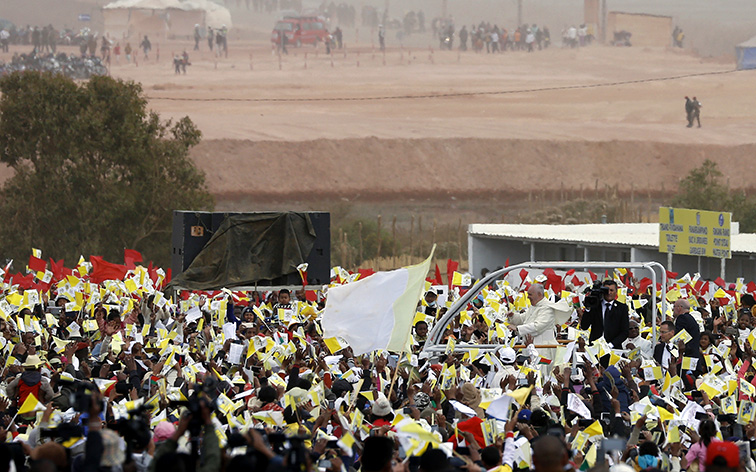
Hard work, tender hearts: Pope prays for Madagascar’s working poor
Later in the day, the pope visited Akamasoa — “The Community of Good Friends” — which was founded by the Argentine Vincentian, Fr. Pedro Opeka, to provide work, housing, education and health care to some of the country’s poorest people.
Instead of picking through garbage, which is what the families were doing before Fr. Opeka came along, now some earn a living breaking granite, while others are involved in construction or work for the community or its schools or clinics.
“This had been a place of exclusion, suffering, violence and death,” Fr. Opeka told Pope Francis, whom he first met 50 years ago in Argentina. Thirty years ago, he continued, “divine providence created an ‘oasis’ of hope where children reacquired their dignity, young people went to school, and parents began working to prepare a future for their children.”
Speaking in the Akamasoa auditorium, Pope Francis said the community and its various activities are a sign of the reality that God lives among the poor, and it is a “tangible sign” of His love for them.
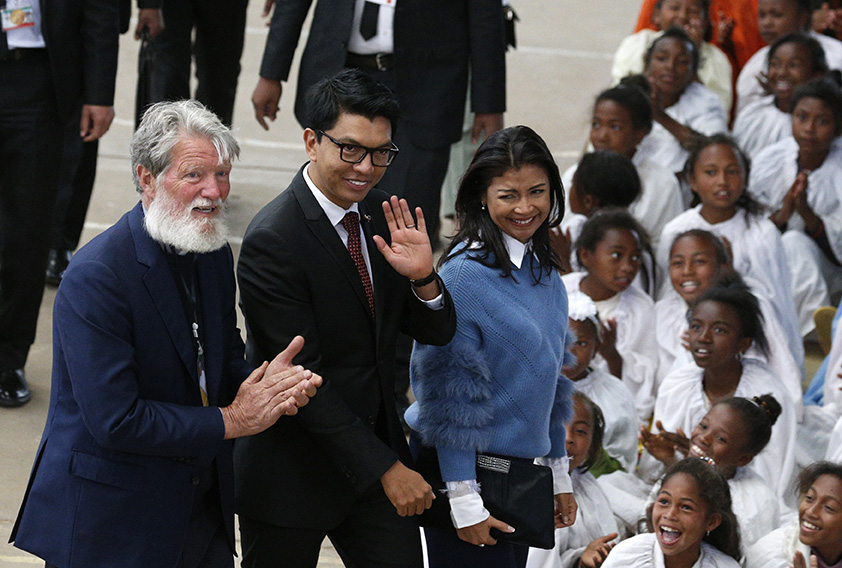
Every corner of Akamasoa, all of its schools and clinics are “a song of hope that refutes and silences any suggestion that some things are ‘inevitable,’” he said. “Let us say it forcefully: poverty is not inevitable.”
“Never stop fighting the disastrous effects of poverty,” he told the younger members of the community. “Never yield to the temptation of settling for an easy life or withdrawing into yourself.”
Pope Francis made it clear that he did not believe the poor wanted pity and handouts but were ready and willing to do hard work and to cultivate discipline, honesty and respect for others.
After his visit to Akamasoa, Pope Francis prayed for those whose daily bread is earned by hard physical labor and for the unemployed longing to earn a living for their families during a visit to the Mahatazana granite quarry on a hill above Antananarivo.
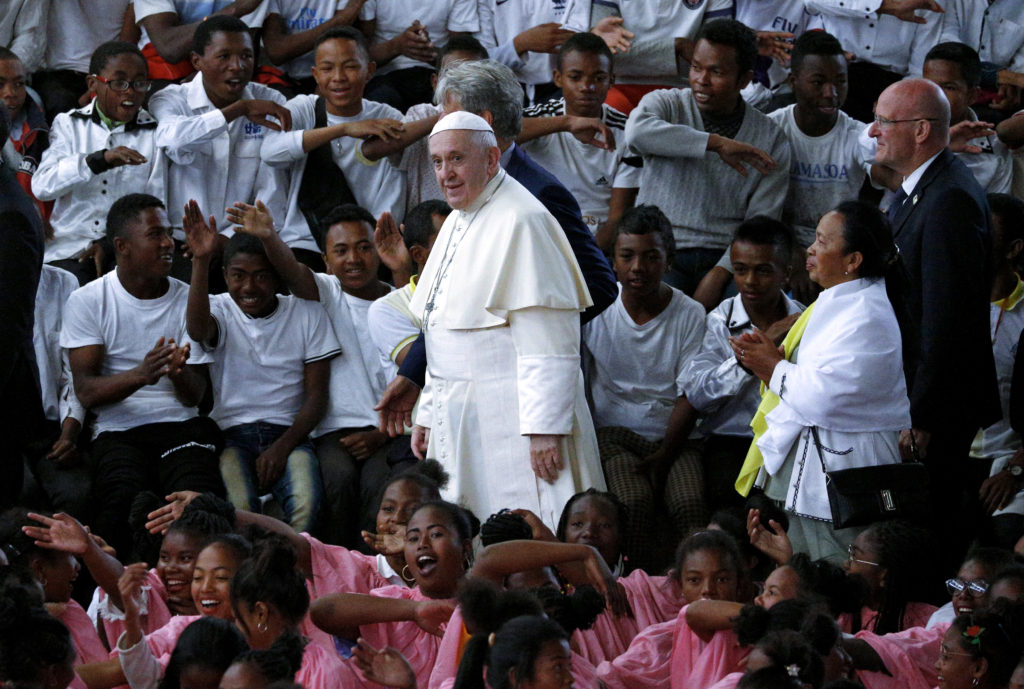
“Before this rock, split by human labor, we pray to you for workers everywhere,” the pope intoned. “We pray for those who work with their hands and with immense physical effort: soothe their wearied frames, that they may tenderly caress their children and join in their games.”
Hanitra Nirina Rasoananahary, 29, one of the quarry workers, told the pope, “our wages are meager, but we are happy to have work. We hope one day there will be more justice for the poor.”
Telling the pope his visit “will help us get up every morning with more courage and strength,” she also told him that chiseling, breaking and moving the stone by hand, “we have made a big hole in the mountain and in the middle of the quarry we erected an altar to thank God for giving us work.”
Rasoananahary told the pope that Fr. Opeka and the Akamosoa community celebrate Mass in the quarry three times a year — on the feasts of the Ascension, the Assumption and All Saints.
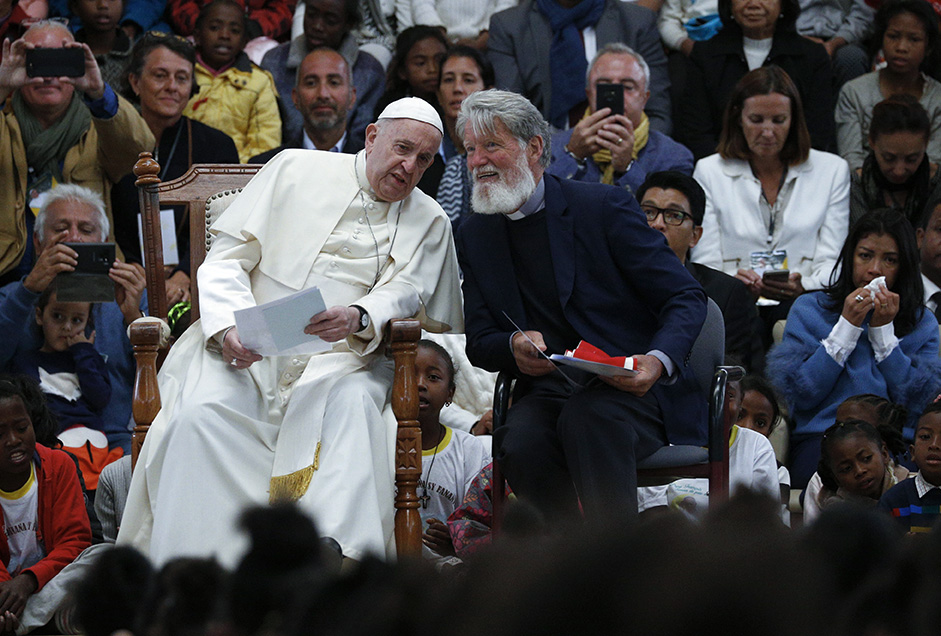
Standing on the hillside overlooking the dusty gray pit, Pope Francis prayed:
- He asked God to protect those who work with their hands and those who desperately search for work. He prayed that parents would not be so exhausted from work that they neglected playing with their children.
- He prayed that poor children would be able to go to school and that teachers would receive a living wage so they would not have to seek second jobs.
- He prayed for “authentic solidarity” among workers and that they would encourage one another and support one another and work together to “constructively defend their rights.”
- The pope also prayed for owners and managers, that they would pay their workers a just wage and ensure them dignified working conditions.
— By Cindy Wooden, Catholic News Service.



